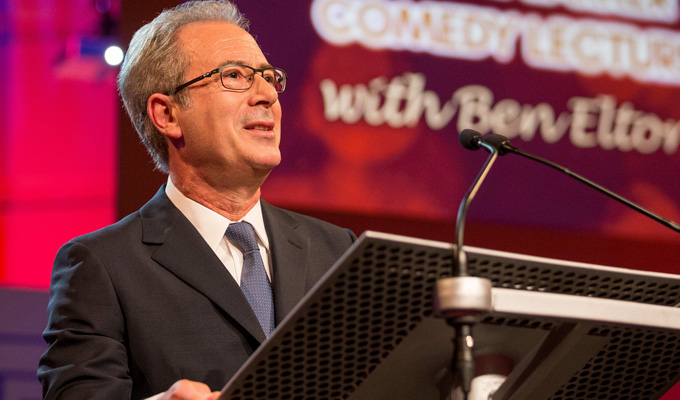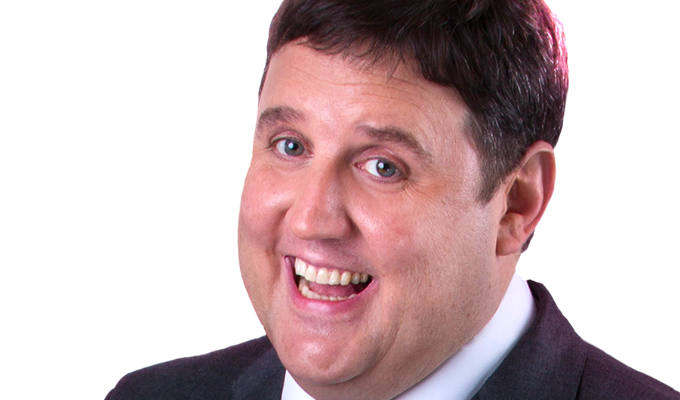 © BBC / Guy Levy
© BBC / Guy Levy Stand up for the sitcom!
Ben Elton wants snobbish critics to be kinder
Ben Elton has launched a staunch defence of the studio sitcom – saying Mrs Brown’s Boys was a ‘quality comedy’ and comparing it to a ‘work of art’.
And he said there was a snobbery about broad, successful comedies with laugh tracks that was rooted in Britain’s class structure.
His comments came in the first BBC Ronnie Barker Lecture, which will air on BBC One tonight.
He said that ‘comedy provokes disproportionate fury’ and that ‘the real venom is generally reserved for a certain style of comedy which seems to make quite a large proportion of comedy critics, commentators and consumers very angry indeed: the studio based sitcom recorded live in front of an audience… Routinely dismissed as hackneyed. Old fashioned and terminally naff. The Cinderella that so rarely gets to go to the Bafta ball.’
He cited the popularity of Mrs Brown’s Boys with audiences if not critics as evidence of this divide saying: ‘Mrs Brown is quality comedy, not to everyone’s taste of course but what work of art of any value could possibly be to everyone’s taste? It’s an exuberant, superbly executed celebration of what for want of a better word you might call ‘"big comedy".
‘A highly talented cast led by an inspired comic star giving an adoring audience a weekly object lesson in big, broad, farcical nonsense. What’s not to respect? But the show is afforded very little. Studio-based sitcom rarely is, at least not in its own day. Oh, it gets respected later, after everyone’s dead, we all know Dad’s Army is a classic now. But when it started the best it got was at best a grudging smile and at worst and angry snarl.’
He also admitted that he had been sneering at popular sitcoms in the past, not least when The Young Ones savaged The Good Life.
‘To be honest I regret that riff,’ Elton says now. ‘I quite liked The Good Life but when you’re young you kick against the establishment don’t you? But as you get older you realise those are real people’s efforts you’re casually denigrating. And you also find out that it hurts.’
He also admitted that he was not an impartial observer, given how much opprobrium he got for his 2013 sitcom The Wright Way, which starred David Haig as a hapless health and safety officer, which one critic described as: ‘Utter utter crap’.
‘Maybe it deserved it,’ Elton mused. Maybe it was that awful. We’ll never know because it disappeared without trace under the weight of the contempt’.
He called for comedies to be given a chance, given that his police sitcom The Thin Blue line received a ‘universal slagging’ the next day. But grew to become widely popular.
‘Through a kind of lazy contempt we are in danger of losing something of real value in our culture,’ he said. ‘Something which once the studios and the talent base that support it are lost will never come again. ‘
He said the shows which received the biggest backlash were those recorded live in front of an audience, ‘an exercise in which clearly laughter is the desired aim. Real vocalised laughter, not internalised smirks, not knowing nods.’
‘So, is that the problem? Is it laughter which offends in comedy? Strangely I think it is. The principle objection to these comedies is that people are laughing.
‘Why is that? I think it’s because we’re British. Because the laughter is evidence of effort. The terrible British sin of "going for laughs". Laughs which incidentally will be routinely dismissed as "cheap" and "easy". Laughs which are clear evidence of the greatest comedic crime of all, the crime of trying to be funny.
‘But is that really such a despicable ambition? Trying and failing may be a shame but is trying at all so terrible? Surely not.’
He said another key difference between studio sitcoms and single camera shows, which tend to get more acclaim, is that ‘when a scene is recorded on a single camera it is made in pieces, covering first one character and then another. The characters in a multi-camera studio sitcom are really talking to each other in real time… In the live studio recording, you are seeing the actors natural timing, in a filmic sitcom you are seeing the editor’s interpretation of it. One style is captured fleetingly on the night, the other is assembled painstakingly in an edit suite.
‘Edgy and obscure can be done on the fly, ironic minimalism and mockumentary on an iPhone with a crew of one. But it takes a village for Rik to break all the bannisters using his bollocks as a battering ram.
‘And of course, all that makes these shows very, very expensive. An expense that frankly is easy to duck if you’re just going to get slagged off for doing it anyway. And so, a great and original television art form is dying. It really is.
‘And while there’s nothing we can do about shrinking budgets, fractured audiences and TV companies turning their precious facilities into prime real estate it might help if commentator, critic and columnist alike stopped treating studio sitcom with such thoughtless contempt. As if the only comic art of any real value is comedy that pretends it isn’t trying to be funny.’
He traced the changing attitudes back to shows such as The Royle Family and The Office, but said ’what began as a fantastic, innovative and refreshing style quickly became a kind of comic orthodoxy, and the inexplicable side effect was that the studio sitcom became overnight a byword for critical contempt’.
He also hit back at the cliché of complaining of ‘canned’ laughter when it is genuine laughs recorded live that are used in sitcoms.
‘If anything, the laughter generally has to be turned down rather than up,’ he said ‘Because studio nights are not cynical. They are fun, exciting, community events. Is it a coincidence that they fell from grace in the aftermath of the 80’s? The decade in which the individual so firmly replaced the community as the social and political focus of the nation. Yes! I’m blaming Thatch!’
Elton also said that the British establishment has always been suspicious of popular success ‘particularly success that comes from below, through conspicuous effort and obvious ambition’.
And he argued that there was ‘nothing simple or lacking in complexity about the shows I’m discussing… behind all that ‘mindless’ laughter often lies human truths as real and revelatory as those explored in any acclaimed drama. That’s why they’re so funny. In real comedy, proper funny comedy, truth is a given. You don’t notice it, that’s why it’s funny. The depth of human understanding lies behind and within the comedy. The intellectual value of the work is rightly and properly masked by the primal, organic, gut driven instinct to laugh. ‘
He insisted he was ‘not trying to mount some horrible populist exercise in anti-intellectualism’ but argued that much of what is dismissed as Broad Comedy is actually ‘very clever indeed – we just don’t notice how clever it is because really good comedy defies analysis.’
‘I’d make a plea that when we write about comedy be it in a newspaper or in a tweet we shouldn’t leap to judgement. I don’t think any comedy should be judged on its first outing, particularly a sitcom which by its nature is designed for the long haul. I honestly don’t think The Young Ones would survive in today’s critical environment; it was big brash and confrontative and very rough around the edges with as many hits as misses in its gag count.
‘Let’s not be so hard on people who are trying to be funny even if we think they failed. Because if nobody’s allowed to fail then no one will think it’s worth trying and without people trying to be funny.’
When Ronnie Barker broke my heart
Ben Elton also revealed that the first time he met Ronnie Barker, at the BBC Light Entertainment Department Christmas Party, ‘was not a very happy’ occasion
‘I can’t tell you how thrilled I was on those nights,’ he said ‘It was the early 80’s! I was young, it was Christmas and I was at the BBC!
‘It was a black-tie event. Some of my generation went all grumpy and alternative and refused to wear black tie; they weren’t going to kowtow to any posh snob elitism. But I loved it; I think that was the beginning of life long accusations of political hypocrisy "voting Labour and wearing a dinner Jacket to a Christmas party! What a sell-out".
‘All the stars were at that party… The Rons always had little clusters round them, Ronnie C’s was very friendly and inclusive, but Ronnie B was a bit more aloof. They used to call him "The Guv’nor" which I think he rather liked and he’d hold court a bit, the channel controllers always gravitated to him. Lots of people did, including Rowan Atkinson, Stephen Fry and me, who were hovering On the Edge of the group, just basking in the fact that we were in the same room as Ronnie Barker.
‘Anyway, after a little while the great man turned to us and looked us up and down. All eyes turned with him. "I like you" he said, looking at Rowan. "I quite like you" he said pointing at Stephen. Before finally turning to me and saying: "But I don’t like you".
‘That was it. No "hello" or anything and completely out of the blue. Then he turned his back. It was a proper moment. Everyone heard, he’d said it quite deliberately. And I was left stood standing in my rented tux looking like a right arse.’
He said he ‘got to know Ronnie later ‘and we laughed about it, but it hurt at the time’.
• The talk was recorded in front of an audience of comedians and comedy bigwigs at the BBC Radio Theatre in Broadcasting House and will air on BBC One at 10.35pm tonight (Friday)
Published: 25 Aug 2017






